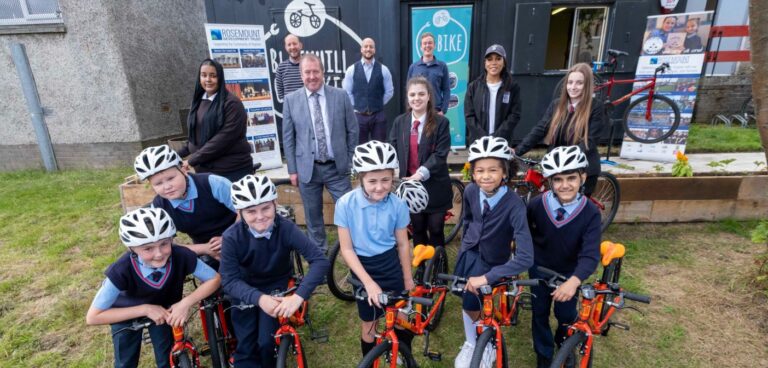The Scottish government has announced the first six pilot projects selected to offer free bicycles for school-age children who cannot afford one.
The new pilots will test their approaches across the next 12 months and will be fully evaluated. They will test delivery models in urban and rural locations, across primary and secondary schools ages and trial various procurement models.
The pilots seek to include local bike shops and will explore opportunities to maximise benefits for the local supply chain, including recycling bikes and encouraging a circular economy approach.
Furthermore, the pilots will test a variety of ownership, loan and subscription models and undertake various methods of assessing need to ensure inclusion and accessibility.
Pilots are linked to existing community networks across schools, charities, cycling clubs and active travel hubs – all helping to determine what the best models of local delivery could look like.
Further pilots will be announced in the coming months. Transport Scotland said it continues to explore opportunities for both an islands project and a specific adaptive bikes pilot. This would build on the provision of existing projects that already offer adaptive bikes for disabled children and young people.
Working in partnership with the Rosemount Development Trust, the Equality Cycles project will support five schools and up to 300 children aged 8-16 years, to encourage active travel to school through the provision of free bikes, including adaptive bikes. The project in Blackhill intends to unlock skills, build confidence and tackle the climate emergency whilst improving physical and mental health.
Scottish Cycling’s Rock Up & Ride programme is a series of free sessions aimed at children aged 7-14 years, which link directly with a cycling club, aimed at delivering a long-term increase in cycling activity and consequently behavioural change.
The Angus Cycle Hub will pilot a central bike distribution centre for the Angus and Dundee areas with regional support being provided by dedicated development workers and bicycle mechanics. The pilot aims to support up to 1000 children aged 4-16 years.
Forth Environment Link working in partnership with Barnardos and operating across Falkirk, Stirling and Clackmannanshire, will deliver a series of bike maintenance workshops, led rides and cycle safety lessons, all with a physical and mental wellbeing focus.
Cycling Scotland’s Cycling Friendly network will see the criteria for Cycling Friendly secondary schools development grant funding extended to prioritise providing bikes for young people aged 12-16 years, who do not have access to one due to affordability. This pilot plans to deliver through 20 schools nationally, with an average 20 bikes per school.
Finally, Sustrans will work West Lothian, Dumfries and Galloway and Aberdeenshire councils to make access to bikes more equitable by providing bikes to children without them and prioritising those who potentially cannot afford them. This pilot aims to support approximately 700 children aged 9-14 years and will be trialled in three ways: a fleet of bikes for each school, bike libraries for long-term bike loans, and ownership.
Scottish transport minister Graeme Dey said: “We’ve still got a lot of ground to cover when thinking about how best we can assess need, build in accessibility for all and ensure supply and delivery models which are sustainable for urban, rural and island communities across Scotland.
“That said, when we look at pilot projects already mobilised, it’s clear that the strength of ambition on display is immediately apparent. We’ll be looking at the evaluation very closely to see what’s working most effectively and inclusively to support future schemes.”





